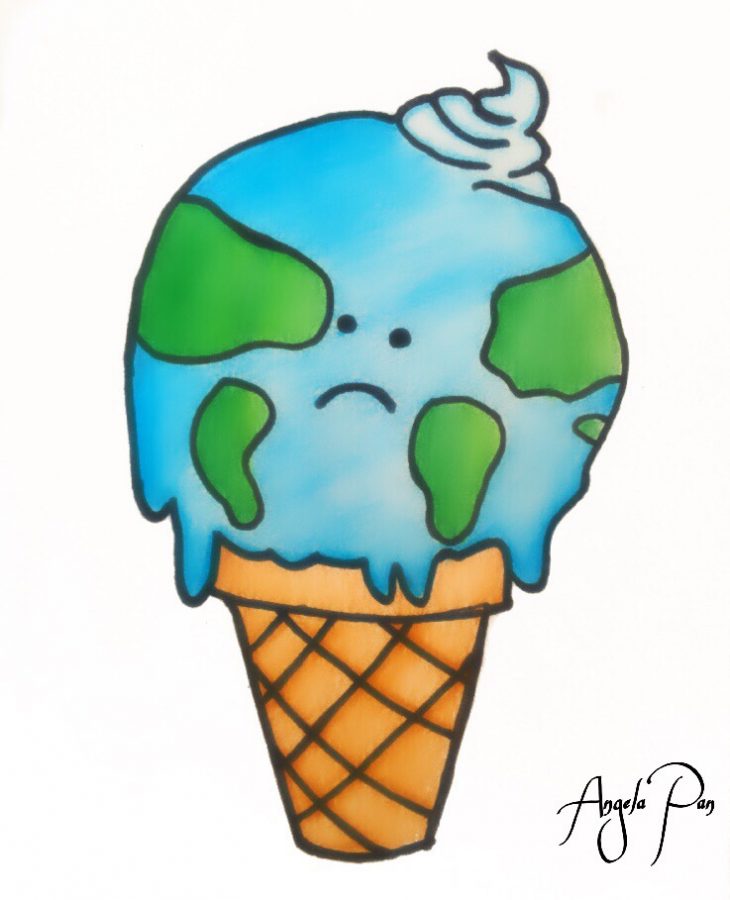Climate Change: A Hot Topic
January 19, 2019
When most people hear “climate change”, they often think of the polar bears and their ice caps, melting away because of humanities environmentally-harmful technology. While yes, the polar bears are endangered and are absolutely important, what about the rest of the world? How does climate change affect all of us? And what can we, the ones guilty of causing it in the first place, do about it?
The United States government enacted the Global Change Research Act (GCRA) in 1990 in an effort to study the effects of climate change: and potentially prevent future consequences. The GCRA developed “a comprehensive and integrated United States research program which will assist the Nation and the world to understand, assess, predict, and respond to human-induced and natural processes of global change” now known as the National Climate Assessment (NCA) [1]. Every four years, the U.S. Global Research Program (USGRP) performs the NCA because of the GCRA mandate, with a goal to “analyze the effects of global change” on several factors that impact all of us [2]. At the end of 2018, the USGRP released the fourth NCA. So what, exactly, can we gather from its findings?
Climate change is a natural phenomenon on our Earth, resulting in shifting weather patterns and global temperatures due to the fluctuation of greenhouse gases – namely carbon dioxide – in the atmosphere. However, with the Industrial Revolution in the early 20th century and the development of fossil fuel-based technology came the huge increase in carbon dioxide — and the massive acceleration in climate change. The NCA concluded that “Earth’s climate is now changing faster than at any point in the history of modern civilization…but the severity of future impacts will depend largely on actions taken to reduce greenhouse gas emissions and to adapt to the changes that will occur” [2]. Present impacts from climate change on just our country include natural disasters like hurricanes, flooding, drought, snowstorms, heat waves, heavy rains, and erosion, all of which cause damage to infrastructure, agriculture, and millions of communities. Our overall annual average temperature has raised by 1.8 ℉: the effect we know as “global warming” [2]. “It’s crazy, really, how warm this winter has been. And I know from what I’ve learned in class that it’s all because of global warming: so how can we fix it?” Ana-Sofia Kyros ‘20 questions.
The NCA also monitors the actions U.S. states take to combat climate change. This includes infrastructure rebuilding/strengthening, flood protection, water conservation, and creating additional plans that tackle the extreme weather patterns that plague the U.S. Nevertheless, these are only little steps taken for a massive problem, one that impacts the world. “I feel that in order to stop climate change, our country has to be a part of it too,” says Thomas Kabamalan ‘19. “We don’t know what’s at stake in the future unless we do something now to stop it.” Climate change is caused by all the carbon dioxide emitted from every industrialized nation, so while the United States makes up a large part of that, it’s up to the world to come together to slow the disastrous effects that will only grow worse each year if not taken care of. Though the Paris Accord – an agreement created by the United Nations very much similar to the GCRA on a global scale – has brought many nations together, after the 2016 election, the United States government made the controversial decision of dropping out of the agreement by 2019. Our country claims it wants to prevent the devastation of climate change, yet it selfishly keeps to itself. If our government cares so much about the effects of climate change then what is the purpose of withdrawing from the Paris Accord? The United States could majorly contribute to the fight against climate change on a global scale, especially for those countries who may not have enough resources to create change. In the end, although the NCA is of great use to our country’s affairs, the United States needs to be involved with the world when it comes to climate change to help solve this problem permanently.
[1] “GlobalChange.gov.” GlobalChange.gov, 2019, www.globalchange.gov/.
[2] Usgcrp. “Fourth National Climate Assessment: Summary Findings.” NCA4, 1 Jan. 1970, nca2018.globalchange.gov/.





